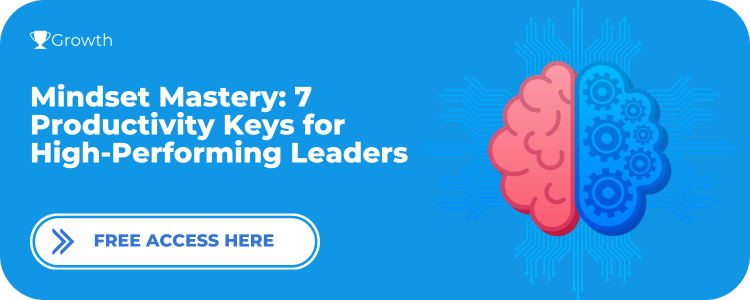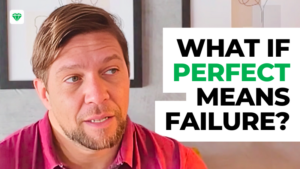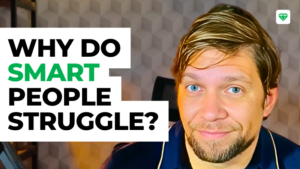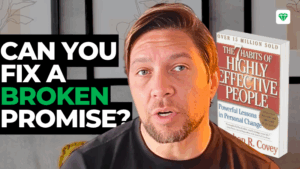✅ FREE ACCESS: Mindset Mastery: 7 Productivity Keys For High-Performing Leaders
Welcome to the second part of our 13 Habits of successful entrepreneurs series inspired by Napoleon Hill’s ‘Think and Grow Rich’ book.
In addition to the 6 habits explored in the previous episode, today, we’re going to cover habits 7, 8, 9, and a step-by-step process to start cultivating them now.
But before we get into it, make sure you grant your lifetime access to our free Workbook:
Mindset Mastery: 7 Productivity Keys for High-Performing Leaders.
This is your chance to develop the 7 mindset keys of the world’s most successful leaders to achieve extraordinary results.
Habit #7: Decision
The 7th of the 13 habits of successful entrepreneurs is Decision.
Napoleon Hill’s research reveals that successful people possess the ability to make decisions promptly, avoiding indecisiveness and procrastination.
And also, once a decision is made, they stick to it unless presented with new and compelling evidence.
This unwavering commitment to their decisions contributes to their achievements.
He says:
“Analysis of several hundred people who had accumulated fortunes well beyond the million-dollar mark, disclosed the fact that every one of them had the habit of reaching decisions promptly and of changing these decisions slowly, if and when they were changed.”
In other words, to embody the habit of decision, you must develop the habit of making firm choices based on thoughtful analysis and unwavering self-confidence.
How to apply
Gather information:
Engage in thorough research and gather all relevant information related to your decision.
Consider different perspectives, seek advice from experts, and study past experiences to inform your choices.
Poorly informed decisions lead to poor results.
Analyze the pros and cons:
This is important. Every decision has pros and cons, which means, you have to make the most favorable choice knowing that you are losing something.
It’s always a trade-off, nothing is 100% guaranteed.
But the more informed you are, the better your chances of achieving the expected results.
So, evaluate the potential outcomes and consequences of each option.
List the advantages and disadvantages of each choice, considering short-term and long-term implications.
Take decisive action:
Once you’ve made a decision, take immediate action to move forward.
Avoid second-guessing or doubting yourself.
Commit fully to your chosen path and have faith in your decision-making abilities.
This is the best chance of success your choice will have.
In the Mindset Mastery Workbook I present an effective decision-making framework using Eisenhower Matrices.
Habit #8: Persistence
The 8th of 13 habits of successful entrepreneurs is Decision.
What’s the difference between insistence and persistence?
Persistence is personal. Insistence is social.
You persist when you adopt a point of view and live by it.
You insist when you demand that other people adopt your point of view and live by it.
So persisting and not insisting is a productive outcome for you and the world around you.
Napoleon Hill wrote:
“The majority of men meet with failure because of their lack of persistence in creating new plans to take the place of those that fail.”
He explains that those who fail often lack persistence because they give up after initial setbacks instead of persistently adapting and creating new plans to replace the ones that didn’t work.
Persistence is essential for overcoming challenges and finding alternative approaches to reach one’s goals.
How to apply
Resignify problems:
Successful entrepreneurs know that problems provide 2 positive outcomes:
- A sense of direction.
- A sense of purpose.
The sense of direction comes from a Confucius quote:
“A healthy man wants a thousand things and a sick man only wants one.”
So, when you have a problem, even though you have many things to do in your day, you know you should focus on that one thing – solving the problem.
That leads to the second positive outcome, the sense of purpose.
There’s no chance you’re going invest time and effort to solve a problem that turns out to be unproductive, unfulfilling, or lacking purpose.
Successful entrepreneurs recognize that beacon of light other people call problems and use that to purposefully steer their actions.
Learn to make strategic comparisons:
Have you heard people online telling you to stop comparing yourself to others?
That’s impossible. You must’ve noticed by now.
As social creatures, we will always compare ourselves to the environment.
Our brain has anciently dedicated neurotransmitters specialized in monitoring yourself against the environment.
So, forget it. You will compare yourself to others. Period.
The smart and only possible move to make here is to strategically answer the question:
“Who should I compare myself to?”
Don’t compare your beginnings to other people’s endings.
What does that mean?
“Beginnings” refer to a hidden process that takes years in the making to only shine on the stage after a series of mistakes, problems, setbacks, and learning.
One of the most famous quotes from Lionel Messi is:
“It took me 17 years and 114 days to become an overnight success.”
If you’re just starting to play soccer and compare yourself to Lionel Messi, you will be petrified.
This comparison doesn’t make any sense.
Instead, you should compare yourself to the beginner Messi and see how far ahead or behind that beginner version you are.
You can take valuable lessons and uncanny motivation out of that.
Habit #9: Power of the Master Mind
The 9th of the 13 habits of successful entrepreneurs is the Power of the Master Mind.
Here is how Napoleon Hill defines a Master Mind:
“The ‘Master Mind’ may be defined as: Coordination of knowledge and effort, in a spirit of harmony, between two or more people, for the attainment of a definite purpose.”
According to Napoleon Hill, the Power of the Master Mind refers to the synergy and collective intelligence that arises when two or more individuals come together in a harmonious spirit of cooperation.
He also states that:
“No individual can have great power without availing themselves of the Master Mind.”
The collective energy and combined expertise of a well-structured Master Mind group can unlock immense creativity, and problem-solving capabilities, and accelerate personal growth and success.
How to apply
If you are decided to run your own Napoleon Hill Mastermind, you will need some structure.
Above all, a mastermind is an alliance for one specific purpose and a reason.
Somehow, it can be considered the apex of teamwork.
These are the steps you must follow to run your own mastermind in the sense Napoleon Hill meant:
Step #1: Define the purpose of the mastermind.
It can be anything you want, ranging from charity to traveling to Mars.
However, make sure the purpose is as clear as possible.
Step #2: Analyze the viability of the purpose.
Identify the skills and the expertise you need, including supportive know-how such as legal or accounting.
Step #3: Decide what compensation each mastermind member will receive.
That is in exchange for their work and cooperation.
It can be money or something different. This is the reason of the mastermind, not its purpose.
Step #4: Approach people that share your vision.
It is important that members think the same way, and have their minds aligned.
If your minds are not in the same wavelength it is not the right candidate.
Step #5: Define clear rules.
Establish rules for meeting frequency, amount of work required, presentation of work, etc.
Organization and structure are important to monitor the performance of the mastermind.
Mindset precedes skillset.
To take part in highly engaging and successful Mastermind groups, you need to acquire a top-performing mindset that will propel your skills.
In the Mindset Mastery Workbook, I present 7 mindset keys to becoming a top-performing leader. All are based on science with step-by-step processes for every mindset key.




